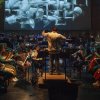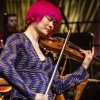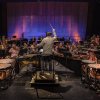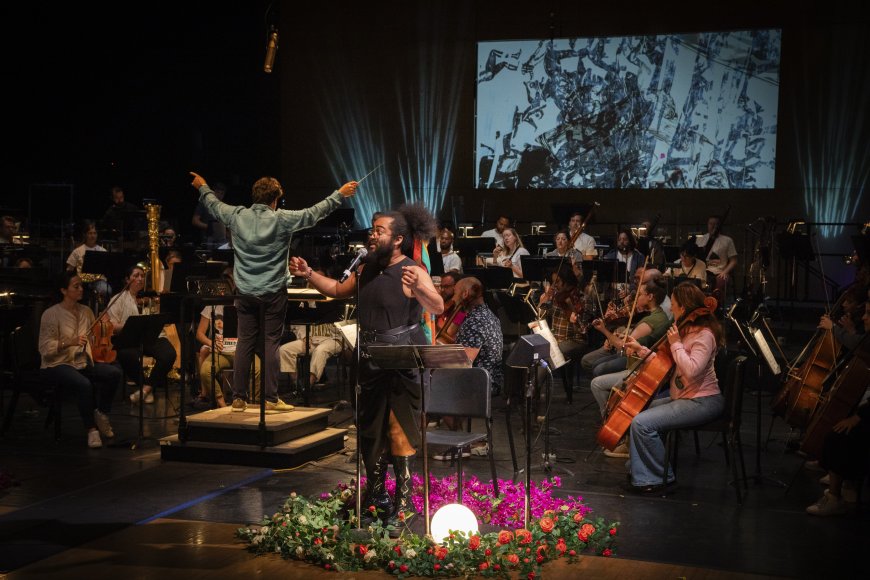
In the face of the anti-diversity, anti-LGBTQIA, and anti-woman rhetoric of the Trump administration, the Cabrillo Festival of Contemporary Music is not backing down from its historic commitment to the widest possible range of composers and performers. This season, which concluded on Aug. 10, featured works by seven men and nine women, of whom at least five identify as LGBTQIA, four are Black, one is Indian American, and one is Latino.
Given the diversity of its composers, the concert of Saturday, August 9, called “Becoming,” neatly fits this season’s theme, “Colorful and Courageous.” Bookending the Icelandic composer Anna Thorvaldsdóttir’s 2020 CATAMORPHOSIS were a work by Lou Harrison — who co-founded Cabrillo — and a work by the young composer, performer, and interdisciplinary artist Darian Donovan Thomas, commissioned by Cabrillo and dedicated to the 50th anniversary of Santa Cruz LGBTQIA pride, a fitting tribute to Harrison’s legacy with the festival.
Cabrillo is delightfully informal — no tuxes or even concert black among performers here — and music director Cristian Măcelaru almost always introduces each work. He characterized CATAMORPHOSIS as “meditative” and “thoughtful,” with “gentle and subtle musical gestures.” That was a surprise; on record, conducted by Daníel Bjarnason with the Iceland Symphony Orchestra, CATAMORPHOSIS is among the scariest and most threatening works I’ve experienced.
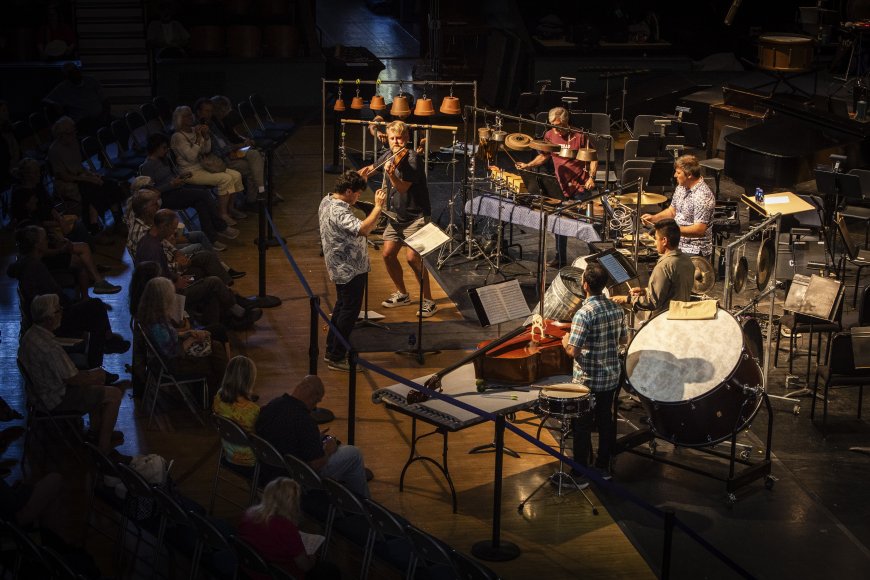
Live performances vary, based on the artistic personalities of the performers and interpretations of the conductors. Măcelaru’s CATAMORPHOSIS was indeed gentle and meditative, though it retained the sense of almost physical mass and enormous subterranean forces at work.
The work incorporates the slow musical transformations and shifts that are typical of Thorvaldsdóttir’s orchestral music. Chords alternate slowly between major and minor, tubas and a piano suggest vast, rumbling energies, and tight dissonances come and go.
The composer’s own notes for CATAMORPHOSIS emphasize polarities of emotion. Măcelaru’s performance emphasized the gentler side of the work, leaning into hope and fragility rather than despair and destruction.
The concert opened with Harrison’s Concerto for Violin with Percussion Orchestra. Harrison built this 1959 concerto around a theme that carries across its three movements in various rhythmic guises, tying the piece through many changes of tempo and mood.
There are just five percussionists, but they play a wide array of instruments, including flowerpots, glass wind chimes, a double bass, triangles, coffee cans, trash cans, gongs, suspended cymbals, mallet instruments and more. Harrison sometimes uses the gamelan-style rhythmic patterns that became such a large part of his musical vocabulary.
It’s a marvelous piece, with an achingly lyrical violin part, played here with fiery intensity by Justin Bruns, concertmaster of the Cabrillo Festival Orchestra and associate concertmaster of the Atlanta Symphony Orchestra. The violin seems to weave around the complex percussion parts, or perhaps the percussion weaves around the comparative stability of the violin.
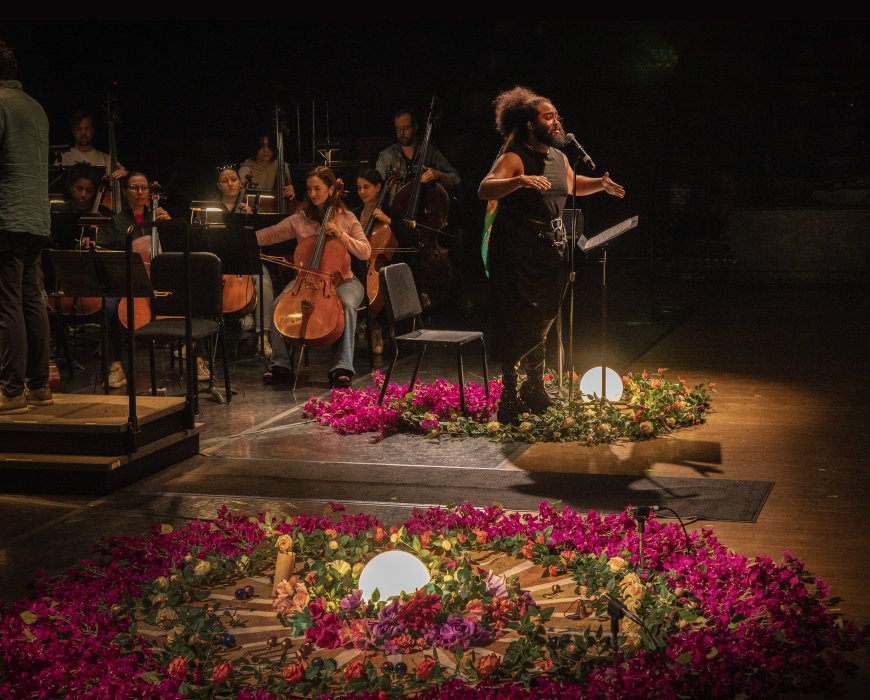
Darian Donovan Thomas’s Flowercloud was an even bigger surprise than the gentleness of CATAMORPHOSIS, and not only because of the heaps of different flowers set up onstage for this piece. Flowercloud is a symphony, but more than that, it’s a meditation for voice and orchestra on queerness. It refers back to the AIDS crisis and to the times before. Thomas drew on Lou Harrison’s writings for some of the lyrics of Flowercloud, referring to him as The Elder, and the composer wrote the balance of the lyrics.
The words are suffused with sadness at the diminishment of the community as so many men sickened and died of AIDS, but also with joy and delight at queerness itself. The fear that queer people lived with prior to AIDS crisis — the fear of losing a job, or your children — is present on the periphery of the lyrics.
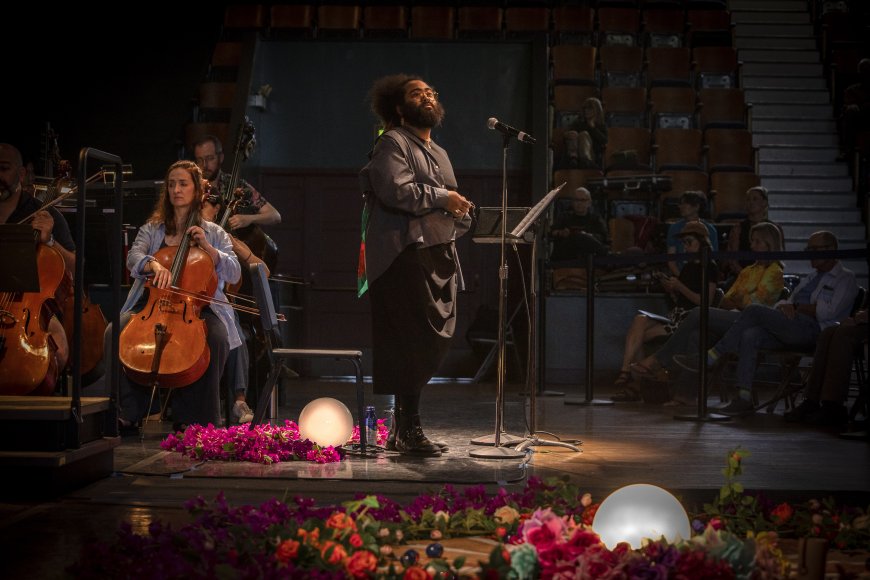
The performance of Flowercloud opened with the orchestra onstage — but then Măcelaru appeared, and each orchestra member stood up and walked offstage. They came back, in ones and twos; a video played on a screen behind the orchestra; one bassoon, then two, returned and started to play. During the rest of the performance, orchestra members wandered up and down the stairs among the audience and around the hall, waving tiny percussion instruments.
Thomas himself was the vocalist for this world premiere, standing among the flowers and looking very much like a latter-day Radical Faerie. He draws you in with a lovely, expressive, and calming voice, soft-grained and almost hypnotic. He’s not the only vocalist in Flowercloud — the orchestra members chatter and laugh during the performance.
There’s plenty of repetition in Thomas’s music — “post-minimalist” comes to mind as an apt stylistic description — and while the emotional mood couldn’t be more different, it still sometimes called to mind Julius Eastman’s Femenine, which Wild Up performed in the Bay Area last year. Thomas, like Eastman, is a Black gay composer, and Flowercloud seems to hark back to Eastman as well as honoring Harrison.
Flowercloud’s four movements, named for the flowers strewn about and with references to queer history, are full of shimmering beauty and grandeur. “Sunflower,” the third movement, is for happiness, warmth, loyalty, vitality, and good fortune, while “Lotus,” the last, stands for purity, rebirth, and strength. “No matter the mud, we’ll grow,” says the composer. Flowercloud is a wondrously kind and optimistic work, a bright light shining in a dark time.


